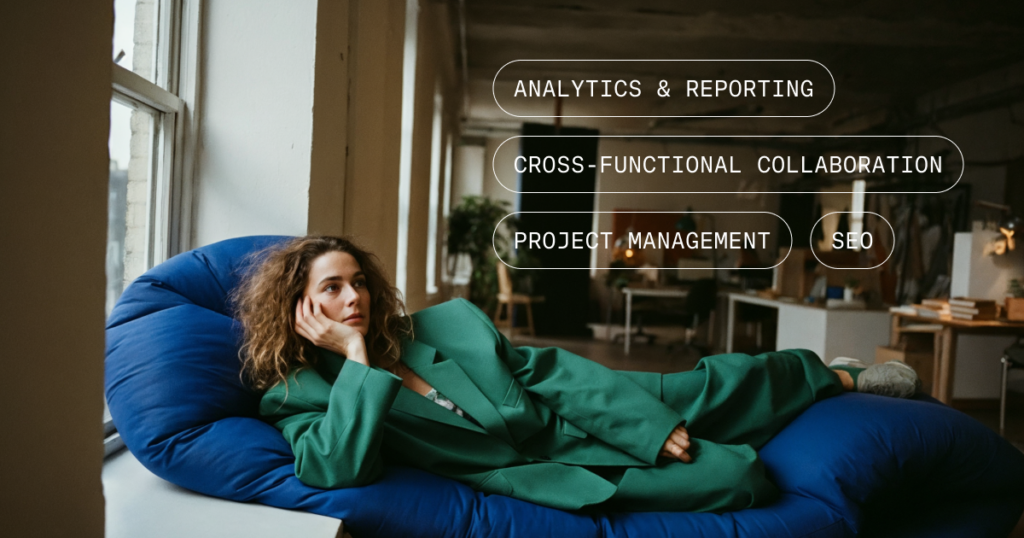The phrase “digital content creation” can mean a lot of things these days. With the full-on democratization of online content that’s spawned thousands (maybe millions) of new creators, it can mean everything from full-time blog writing and freelance video production to helping your aunt with her art account on Instagram.
Aside from these easy-to-imagine tasks, you also have new entrepreneurs trying to develop and execute entire digital marketing strategies by themselves. So many people engaging in content creation at all levels has accelerated the pace of progress and raised a lot of questions.
What does this landscape mean for marketing pros? What type of skills, tools, and strategies do you need to succeed? And what can you learn from new creators to improve marketing work?
What Does It Mean to Be a Digital Content Creator?
A digital content creator is anyone who produces content that’s meant to be consumed digitally or online. Content commonly refers to written content (copy), images, and video, but it can also mean audio such as music and podcasts.
The definition of a digital content creator has expanded substantially since the rise of social media as we know it today. Gone are the days of needing professional equipment and a studio to film video, all you need is a phone and a ring light to bring content to life.
As the accessibility of content creation has expanded to allow more and more people to create at a professional level, digital content has become both commoditized and democratized, leading to more people creating content for money than ever before.

The True Role of a Digital Content Creator
The true role of a content creator is complex. Sure, it means brainstorming, producing, and — much of the time — distributing content, but for marketers it also means connecting ideas, connecting with the audience, and conveying a brand’s ethos in a way that truly resonates with people.
Clearly, this is easier said than done, and it all goes back to that timeless goal of marketing: Reach the right person with the right message at the right time.
To accomplish that mission, digital content creators have come to possess a lot of responsibility (for better or worse). Here are just some of the key responsibilities a digital content creator might have:
- Content ideation: Brainstorming content around key milestones, events, products, and relevant news is generally priority number one for a digital content creator.
Content production: Whether this is writing web copy, creating social posts, making graphics, or anything in between, this is where the actual creation comes in re: content creators.
- Content distribution strategy: It’s not enough to simply create content and post it (we want to reach people with the right message at the right time, remember?). Instead, content creators develop distribution strategies that take full advantage of the pieces they produce to both increase efficiency and tell a compelling brand story.
For example, a blog written for a website can be broken into an email series, the blog transcript can be recorded for YouTube, or key stats and graphics can be repurposed on social media channels.
- Editorial duties: If you’re posting the content, you’re also likely editing the content once it’s gone live. This can mean adjusting details, fixing typos, posting supporting content when the need arises. This also means planning future content and participating (or leading) maintenance of the content calendar.
As you can see, the role of a digital content creator can be incredibly multifaceted, especially when working on different content types across numerous channels. There are common threads, however, and those are the audience and the story.
Like we mentioned before, it’s not enough to write a blog post and call it a day. That blog post needs to be contextualized within the overall marketing strategy of a business and, better yet, it needs to fit within the story a business is trying to tell. The story you’re trying to tell is mainly informed by the brand’s ethos and — you guessed it — the audience.
From basics like what problem the business is trying to solve and the digital product or service’s benefits all the way to the individual person you’re trying to reach and the pain point you’ll solve for them, it’s an essential part of a content creator’s role to help connect those dots to form a full marketing picture.

What Skills Are Essential for Content Creation?
Just like there are a lot of responsibilities that come with being a content creator, there are also a lot of skills that are becoming increasingly necessary to be successful. Let’s discuss a few of those now, starting with the basics (and a few you may not expect):
Writing and Editing
Writing and proofreading (and/or editing) are some of the most important — if not the most important — skills a content creator can have. Unless you’re strictly involved in graphic design as an individual contributor, it’s likely that there are words to be written, especially if you want to grow your business as a digital content creator.
Graphic Design
As a content creator, you may be asked for graphic mockups, assets for social posts, infographics, or other pieces of visual content to supplement writing. Depending on the situation, you may have support in this area, but it’s even better if you have basic photo editing and graphic design skills to create suitable placeholders. Not only does this increase work efficiency, it makes you more marketable as well.
Video Editing
Again, you may or may not encounter this based on the type of work you do, but basic video editing is another skill that’s great to have in your repertoire as a creator. You may be asked to convert a blog post into a video script or you may be tasked with creating short-form videos for social.
Social Media Management
Speaking of social, a working knowledge of the various platforms — think TikTok, Instagram, YouTube, Snapchat, etc. — and how they perform from a content distribution and community management standpoint is key.
Social media tends to get lumped in with content creation in general, and that’s not a coincidence. More often than not, social media is a key channel for promoting marketing content, and a lot of digital content creators get their start making a living on platforms like Instagram before branching out. And no, to be a successful content creator you don’t need to become a social media influencer (unless you want to).

What Else Should I Know How to Do?
Aside from these core four, there are other skills that successful creators tend to pick up over time. What can we say? Creators tend to wear many hats, and here are just a few more to consider:
- Analytics & reporting: Another key facet of content creation is reporting on results. Depending on where and how you’re producing content, you may be asked to report on metrics like reach, engagement, and clicks or views.
Understanding the difference between a vanity metric like three-second views and a KPI that drives results like clicks to a landing page is essential. In a nutshell: One looks great on a slide and one impacts the bottom line.
- Cross-functional collaboration: Content is rarely created in a silo. Whether you’re working with peers to produce content or taking stakeholder feedback to inform your ideas, being ready and willing to work with others (and not taking constructive feedback personally) is a key skill.
- Project management: For better or worse, as a digital content creator sometimes you also need to be the one connecting the dots. You have a tactical view into the what, when, and how, so use that to your advantage to deliver content accurately and on time.
- Search engine optimization (SEO): Whether or not you’re pulling the levers on the back end, having a working knowledge of SEO best practices to more effectively insert links into content, hone in on key search phrases, and answer the right questions with your writing is important.
It serves to drive better results in the short term for the piece you’re working on and also inform improvements to your content ideation in the long run. A win-win.

What Are the Best Tools for Content Creation in 2024?
Now that we know about the (many) skills of a successful content creator, how about the tools? Here are three popular platforms designed to help content creators with their work in 2024:
Canva
Canva is an online graphic design tool used to create images of all kinds. While you’re able to use Canva for free, many of its premium features are what enable digital content creators to thrive professionally as well.
A mood board template within the free version of Canva
Canva specializes in graphic design, allowing you to use templates or start from scratch to create just about anything you can think of. With a free plan available, you can get started without paying, but it’s worth considering Canva Pro if you plan on designing with any regularity.
Pixlr
Pixlr is a free online photo editor with AI-assisted tools. As an alternative to Photoshop, it does everything you need to create logos, edit photos, and put together assets for digital content. You can adjust existing photos, edit, resize, add text, and more to create viable graphics without the need for paid software or outside expertise.
The Pixlr photo editor in action
Figma
Figma is a free-to-use, collaborative web design platform that lets you take a website from start to finish with a focus on working cross functionally. Whether you have technical knowledge already or are starting from square one, Figma will meet you where you are in terms of expertise to create a beautiful and functional end product.
An example of Figma’s collaborative design tool
Take advantage of templates and UI kits to hit the ground running, or explore Dev Mode to collaborate in real time with engineers and designers to bring a website to life. Gone are the days of lagging stakeholder feedback and speaking in different creative languages. With Figma, you can get down to brass tacks in real time.
Three Tips for Improving Content Creation Skills
Be Flexible
It can take a long time to build even one skill let alone several. Focus on your bread and butter at first, but always be on the lookout for opportunities to broaden your skill set. Instead of scoffing at opportunities that are currently outside your wheelhouse, instead see them as ways to learn new skills, improve the ones you have, and become a more marketable content creator.
This can also extend to projects you seek out as well. Who knows? You may find yourself confidently searching for editing contracts when you’ve only been a writer on paper.
Practice Your Skills
This may seem like a no brainer, but practice is an important and often overlooked component of content creation. Sure, you may not be getting paid for everything you do, but the improvements to be had from practicing in your off time cannot be overstated.
Work on a personal project like a blog or YouTube channel, help a friend or relative with their social posts, or offer your time and skills in a volunteer capacity. You’ll get better at creating content, and be more fulfilled to boot.
Don’t Take It Personally
A huge component of being a content creator is receiving and delivering feedback. It’s tempting to treat your work as precious and maybe even be a little defensive when someone challenges it. Instead, look at every bit of feedback as an opportunity for improvement and try not to take constructive feedback personally.
If you can master this soft skill, you’ll be easier to work with, produce better content, and communicate more effectively.

Putting It All Together: How Will Mastering Digital Content Impact Your Career as a Creator?
If you’re involved in content in any capacity, you know how fast-paced the industry is. Broadening your knowledge to create in new mediums, post on new platforms, and explore new marketing channels will make you more desirable to anyone who needs creative services.
At first glance, becoming a digital content creator seems straightforward — just create content, right? — but the paths and opportunities are as numerous and as branching as the challenges can be. That’s why we’re advocates of embracing a continuous learning mindset, and using the tools, tips, and skills in this guide will only set you up for long-term success.
Now what are you waiting for? Go forth and create!













